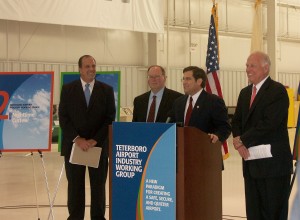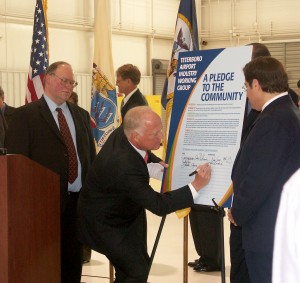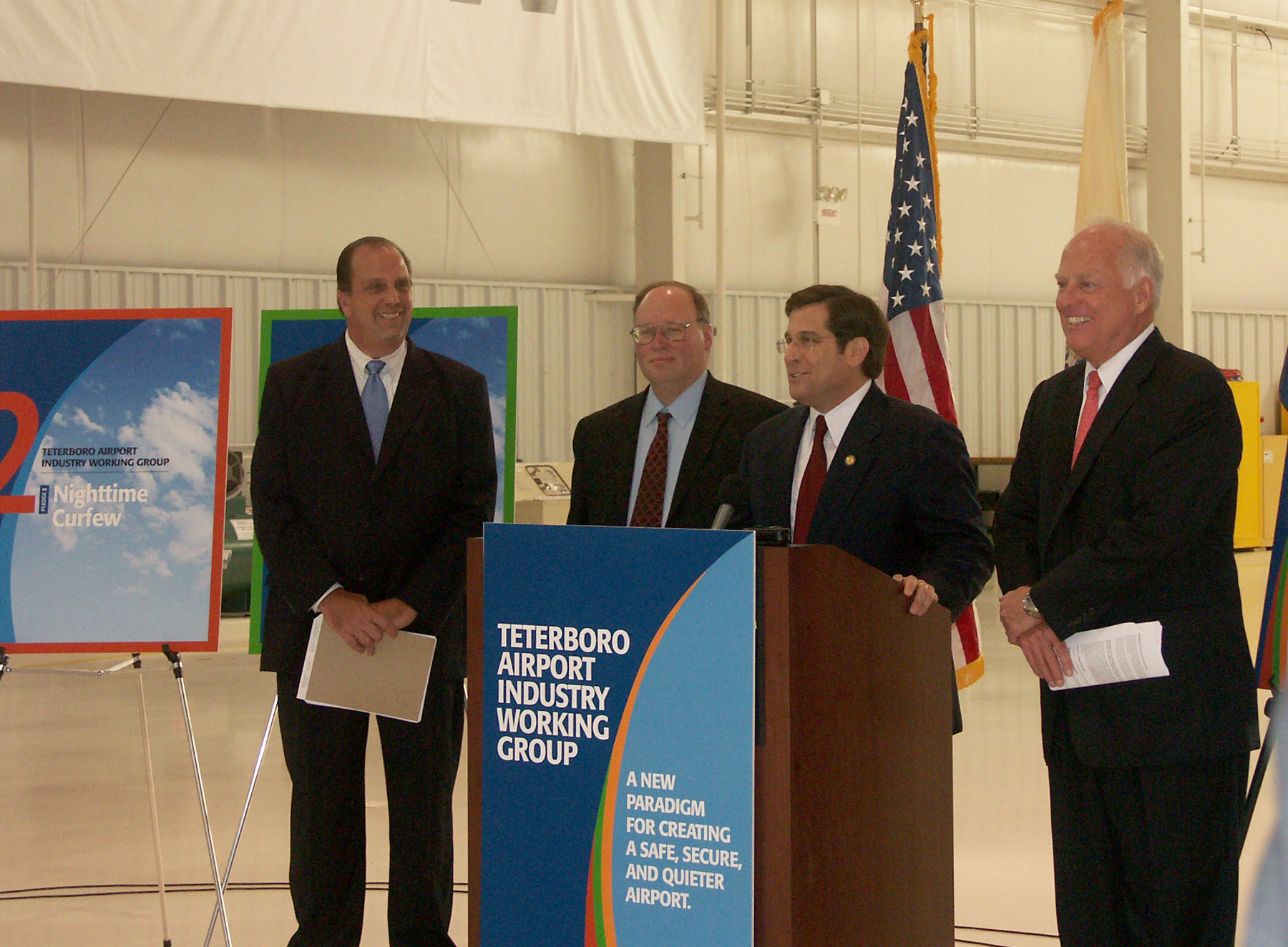By Henry M. Holden

Congressman Steven Rothman describes the TEB Industry Working Group. Behind him are co-chairs (L to R) Joe Fazzio, GM of Atlantic Aviation; Bill DeCota, Port Authority aviation director; and James Coyne, president of NATA.
On October 4, U.S. Congressman Steven Rothman (D-NJ), held a press conference to announce new voluntary flight rules and an agreement between his office, Teterboro Airport (TEB) and the Port Authority. Conference participants included James K. Coyne, president, National Air Transportation Association; Bill DeCota, aviation director, Port Authority of New York and New Jersey; and Joseph Fazio, general manager, Atlantic Aviation.
In recent years, noise and accidents have increased political pressure to limit and cutback airport operations. A voluntary nighttime curfew was set, as well as a reduction in the weight restriction, to 100,000 pounds. Corporate aircraft at Stage 2 noise level, manufactured in the 1970s to the mid-1980s, were also discouraged. Stage 2 jets number about 1,300 nationwide and constitute about five percent of TEB’s aircraft operations.
TEB, the third busiest airport in the state, handled more than 200,000 aircraft operations in 2005. After four nonfatal, on-airport accidents in four consecutive months, the pressure was on the airport to reduce air traffic.
The Teterboro Airport Industry Working Group, a diverse group of aviation industry professionals, hammered out the agreement. The group represents about 50 percent of the airport operations. The Port Authority, which manages the airport, the five fixed base operators, and tenants (including NetJets, Dassault Falcon and AIG) are included in the agreement. The agreement covers Stage 2 aircraft, the nighttime curfew, weight limitations, safety and security.
At the heart of the issue are noise concerns, which make this agreement different from the existing voluntary efforts, according to Congressman Rothman.
“A handful of operators here at the airport understood that maybe it would be a good idea if they didn’t fly after midnight,” he said. “However, it was nothing more than that. Now you have a signed commitment—a pledge that they will not operate between 11 p.m. and 6 a.m., except for an essential operation, such as an air ambulance. Now, they’ll be going around the country telling others that they will not be welcome at Teterboro Airport between 11 p.m. and 6 a.m.”

Bill DeCota waits as James Coyne signs the pledge. “The best way to work through issues of safety, security and noise is to broaden the dialogue, to include those directly connected to airport operations,” Coyne said.
Rothman thinks the pledge will achieve 90 percent compliance by the end of 2007.
“If that doesn’t occur, we’ll address the options,” he said. “For example, we can always legislate. Depending on how Congress members react, it may be easy or more difficult to enact restrictive legislation. Cases around the country might make lawsuits easier or more difficult. I think here we did a better thing. We got people of good will to agree to sensible changes. If we have a failure of good faith, or if these pledges don’t achieve the results we expect, we’re not giving up.”
It’s widely expected that Stage 2 aircraft banned from TEB will choose Morristown Municipal Airport (MMU), about 30 miles west of TEB. MMU is the closest reliever airport capable of handling business jets. The agreement is having repercussions in the community surrounding MMU, and Morris County officials predict the agreement will increase aircraft noise at their airport.
MMU is the second busiest airport in New Jersey, behind Newark Liberty International Airport (EWR). It handled more than 217,000 aircraft operations in 2005. MMU is home to about 300 aircraft, including jets, helicopters and turboprops. It has voluntary flight restrictions similar to those of TEB, and strict noise abatement procedures.
“Since our airport is the closest to Teterboro, we have to assume that flights diverted from Teterboro will come here,” said Maria Renner, government affairs manager for MMU. “We can’t legally say no to them.”
The Federal Aviation Administration said the proposed changes at Teterboro could land the parties in court or jeopardize federal funding. In a letter to the Port Authority, the FAA said it didn’t “see any relation between safety and the kinds of restrictions on airport use” the Port Authority has proposed. Airports that receive federal funds must provide access to all types of aircraft, and federal law prohibits bans on specific types of aircraft.
“Teterboro has an obligation to keep the airport open to the public without restriction,” said Arlene Murray, FAA spokesperson.
Rothman and Anthony Coscia, chairman of the Port Authority, are preparing for a legal battle, if the FAA tries to halt the Teterboro initiatives. U.S. Congressman Rodney Frelinghuysen (R-NJ), whose district includes MMU, fired off a letter to Coscia, opposing the potential move. He plans to match the zeal shown by his opponents.
“If the changes at Teterboro result in added traffic to Morristown Airport, all hell will break loose,” Frelinghuysen said.
It appears the agreement isn’t the end of a long battle, but perhaps the beginning of darker and more unfriendly skies over northern New Jersey.











